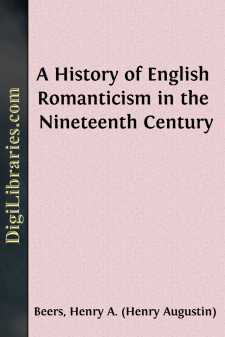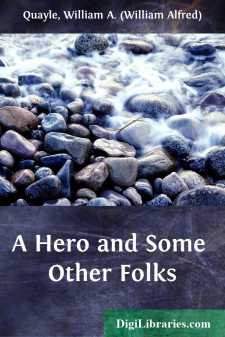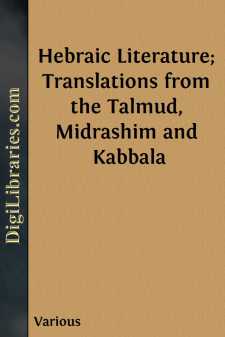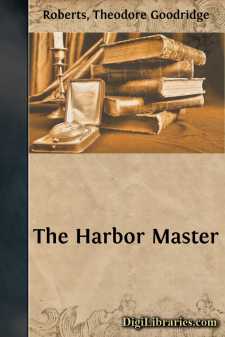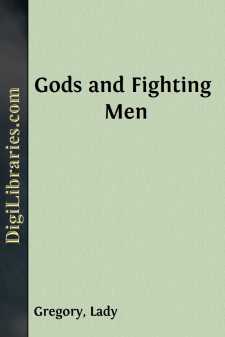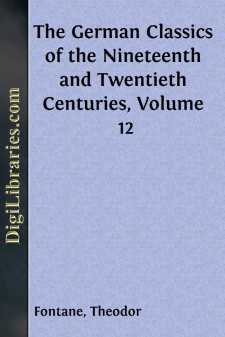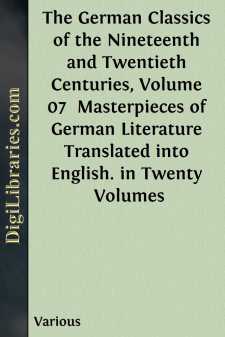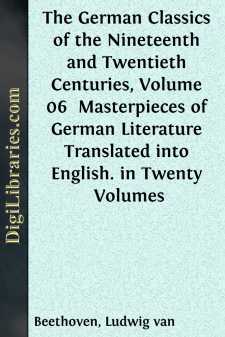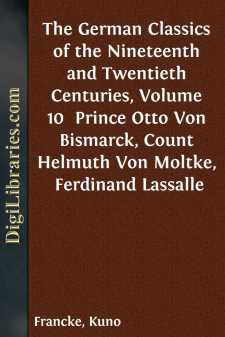Literary Collections
- American 84
- Ancient, Classical & Medieval 14
- Asian 1
- Australian & Oceanian 1
- Canadian 55
- Continental European 121
- English, Irish, Scottish, Welsh 179
- Essays 160
- General 24
- Letters 46
- Middle Eastern 1
Literary Collections Books
Sort by:
CHAPTER I. Walter Scott.[1] It was reserved for Walter Scott, "the Ariosto of the North," "the historiographer royal of feudalism," to accomplish the task which his eighteenth-century forerunners had essayed in vain. He possessed the true enchanter's wand, the historic imagination. With this in his hand, he raised the dead past to life, made it once more conceivable, made it even...
more...
Jean Valjean The hero is not a luxury, but a necessity. We can no more do without him than we can do without the sky. Every best man and woman is at heart a hero-worshiper. Emerson acutely remarks that all men admire Napoleon because he was themselves in possibility. They were in miniature what he was developed. For a like though nobler reason, all men love heroes. They are ourselves grown tall,...
more...
by:
Various
SPECIAL INTRODUCTION Among the absurd notions as to what the Talmud was, given credence in the Middle Ages, one was that it was a man! The mediaeval priest or peasant was perhaps wiser than he knew. Almost, might we say, the Talmud was Man, for it is a record of the doings, the beliefs, the usages, the hopes, the sufferings, the patience, the humor, the mentality, and the morality of the Jewish people...
more...
CHAPTER I BLACK DENNIS NOLAN At the back of a deep cleft in the formidable cliffs, somewhere between Cape Race to the southward and St. John's to the northward, hides the little hamlet of Chance Along. As to its geographical position, this is sufficient. In the green sea in front of the cleft, and almost closing the mouth of it, lie a number of great boulders, as if the breech in the solid cliff...
more...
by:
Lady Gregory
CHAPTER I. THE FIGHT WITH THE FIRBOLGS It was in a mist the Tuatha de Danaan, the people of the gods of Dana, or as some called them, the Men of Dea, came through the air and the high air to Ireland. It was from the north they came; and in the place they came from they had four cities, where they fought their battle for learning: great Falias, and shining Gorias, and Finias, and rich Murias that lay to...
more...
by:
Various
INTRODUCTORY. This volume speaks so well for itself that it does not need many words of preface to commend it to a wide circle of readers. Its rich and varied contents, however, become far more interesting when interpreted by the motive that won them from their authors; and when the kindly feeling that offered them so freely is known, these gifts, like the pearls of a rosary, will be prized not only...
more...
by:
Theodor Fontane
THE LIFE OF GUSTAV FREYTAG By ERNEST F. HENDERSON, PH.D., L.H.D. Author of A History of Germany in the Middle Ages; A Short History ofGermany, etc. It is difficult to assign to Gustav Freytag his exact niche in the hall of fame, because of his many-sidedness. He wrote one novel of which the statement has been made by an eminent French critic that no book in the German language, with the exception of...
more...
by:
Various
THE LIFE OF GEORG WILHELM FRIEDRICH HEGEL BY J. LOEWENBERG, PH.D. Assistant in Philosophy, Harvard University Among students of philosophy the mention of Hegel's name arouses at once a definite emotion. Few thinkers indeed have ever so completely fascinated the minds of their sympathetic readers, or have so violently repulsed their unwilling listeners, as Hegel has. To his followers Hegel is the...
more...
THE LIFE OF HEINRICH HEINE BY WILLIAM GUILD HOWARD, A.M.Assistant Professor of German, Harvard University I. The history of German literature makes mention of few men more self-centered and at the same time more unreserved than Heinrich Heine. It may be said that everything which Heine wrote gives us, and was intended to give us, first of all some new impression of the writer; so that after a perusal...
more...
by:
Kuno Francke
BISMARCK AS A NATIONAL TYPE[1] BY KUNO FRANCKE, PH.D., LL.D., Litt.D. Professor of the History ofGerman Culture, Harvard University. No man since Luther has been a more complete embodiment of German nationality than Otto von Bismarck. None has been closer to the German heart. None has stood more conspicuously for racial aspirations, passions, ideals. It is the purpose of the present sketch to bring out...
more...


